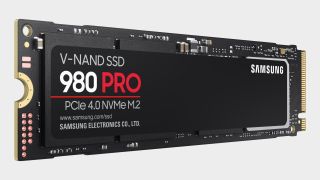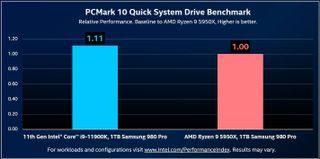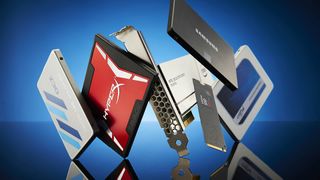Intel claims your PCIe 4.0 SSD will run faster on Rocket Lake than an AMD system
Rocket Lake will make PCIe Gen 4 SSDs fly faster than Ryzen, Intel says.

In just a few more weeks. Intel's Rocket Lake CPUs will blast off into the retail space, bringing with them support for PCI Express 4.0, an amenity that has been available to AMD users for around a year and a half now (starting with Zen 2, or AMD's Ryzen 3000 series). Though Intel is showing up late to the party, it plans to crash it by delivering faster storage performance through the PCIe 4.0 bus.
In no uncertain terms, Intel says its "11th Gen Core desktop platform delivers up to 11 percent better PCIe Gen 4 storage performance vs the AMD Ryzen 9 5000 platform." As supposed proof of this claim, Intel benchmarked a 1TB Samsung 980 Pro SSD on two high-end systems sporting flagship CPUs from each company.
On the Intel side, the testbed consisted of a Core i9 11900K CPU mated to an Asus Z590 ROG Maximus XIII Hero motherboard, along with 32GB of DDR4-3200 RAM and an Nvidia GeForce RTX 3090 graphics card. And for the AMD testbed, Intel equipped it with a Ryzen 9 5950X CPU paired with an Asus X570 ROG Rampage VIII motherboard, with the same RAM and GPU. Both were running on Windows 10 20H2, installed onto a 512GB Intel 760p SSD (leaving a half-filled 980 Pro to be tested in isolation).

Intel's Ryan Shrout posted the above performance comparison graph on Twitter as a "sneak peek" of Rocket Lake's PCIe Gen 4 storage performance. This raised the question as to whether the AMD system benefited from having the 980 Pro installed into an M.2 slot that is directly attached to the CPU like the Rocket Lake platform, rather than the X570 chipset.
"Allyn didn't test using the M.2 slots, he used a x16 slot with a riser card to make sure it was CPU attached on both platforms," Shrout explained in a follow-up tweet.
So, PCIe 4.0 SSDs run faster on Rocket Lake than Ryzen, case closed, right? Not so fast. This is but a single benchmark, and not even the full one at that—UL describes the Quick System benchmark as being a "shorter test with a smaller set of less demanding real-world traces," noting it is appropriate to run on "smaller system drives that are unable to run the Full System Drive benchmark.
In other words, it's a cherry-picked result likely showing off the best case scenario, and not necessarily representative of how PCIe 4.0 SSDs perform in general in relation to two separate platforms from Intel and AMD.
The biggest gaming news, reviews and hardware deals
Keep up to date with the most important stories and the best deals, as picked by the PC Gamer team.

Best SSD for gaming: the best solid state drives around
Best PCIe 4.0 SSD for gaming: the next gen has landed
The best NVMe SSD: this slivers of SSD goodness
Best external hard drives: expand your horizons
Best external SSDs: plug in upgrades for gaming laptops and consoles
Granted, it is entirely possible that Rocket Lake squeezes additional performance out of the fastest and best SSDs for gaming than what we have seen from AMD so far, and if so, hat tip to Intel. But it is also possible that other benchmarks will paint a different picture. There is just no way of knowing right now.
The good news is, both Rocket Lake and the two most recent iterations of Ryzen desktop CPUs (5000 and 3000 series, when paired with an X570 or B550 motherboard) can tap into PCIe 4.0 SSDs, some of which are rated to deliver data transfers in excess of 7,000MB/s. This mostly amounts to bragging rights, though in certain situations, an 11 percent advantage could be meaningful.
Gaming is not one of them, at least not right now. As things currently stand, even SATA-based SSDs perform nearly as well in gaming as the fastest NVMe SSDs, despite a monumental gap in rated performance (the fastest SATA SSDs top out at around 550-580MB/s). That may change with the newest game consoles both sporting PCIe 4.0 SSDs, which will encourage developers to leverage faster speeds. But for now, even just a SATA SSD is good enough for gaming.
Paul has been playing PC games and raking his knuckles on computer hardware since the Commodore 64. He does not have any tattoos, but thinks it would be cool to get one that reads LOAD"*",8,1. In his off time, he rides motorcycles and wrestles alligators (only one of those is true).
Most Popular





